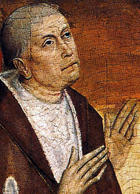
He was born in Kues / Cusa, Trier (Germany) in 1401 and died in Todi, Umbria (Italy) in 1464. Philosopher and theologian, is considered the father of German philosophy, key figure in the transition from medieval thought the Renaissance and, therefore one of the first philosophers of modernity. In its wake Kant, Hegel, Leibniz, Fichte, Schelling and Schleiermacher are located. He studied Greek, Hebrew, philosophy, theology, mathematics, astronomy and other disciplines in Heidelberg and Padua. In 1424 he obtained a doctorate in canon law and theology matriculation in 1425 in Cologne, where he received the doctrines of Albert the Great, Platonism and Ramon Llull.
Since 1426 he is secretary of the papal legate, allowing you access to the world of the humanists; is dedicated to the study of the codices and come to find up to 800 texts of Cicero, 16 comedies of Plautus ... anti-Aristotelian and anti-scholastic, he was one of the first philosophers to question the geocentric model of the world. In his political and ecclesiastical diplomatic task it was characterized by the pursuit of understanding and dialogue: participated in the councils of Basel, Ferrara and Florence; got a brief period of reconciliation between the Catholic and Orthodox Churches, he tried to bring the Hussite and brokered peace between France and England.




